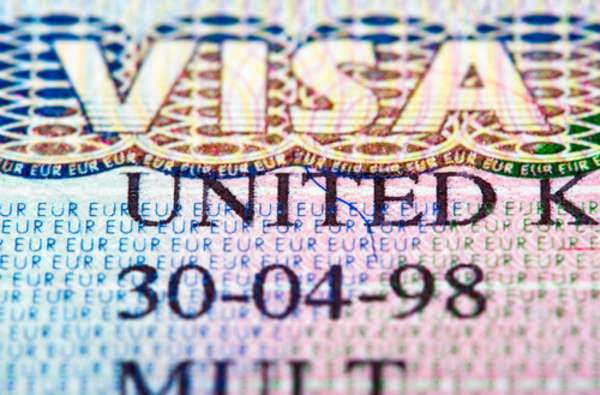5 Things To Know About Arizona Immigration Law

Arizona is well-known for its immigration laws, with some of the most controversial and widely debated legislation in the United States. Over the years, a lot of people have been misled by stereotypes of what Arizona’s immigration laws entail. This article aims to set things straight by highlighting the most important things to know about Arizona’s immigration laws.
1. Introduction
Arizona’s immigration laws often generate heated debates amongst lawmakers, activists, and ordinary citizens alike. To understand the laws in Arizona, it is important to understand the larger context of federal immigration laws set forth by the United States government. Arizona has built its immigration laws upon these federal laws and adopted additional regulations meant to address specific challenges unique to the state. In this sense, Arizona’s laws are both complementary and supplementary to the federal immigration laws.
2. The Role of Federal Immigration Laws
Before discussing Arizona’s immigration laws, it is essential to understand the role of federal immigration laws. The Immigration and Nationality Act of 1965 is the primary law governing immigration in the United States. The Act sets the framework for legal immigration, including family-sponsored and employment-based visas, green cards, and naturalization. Non-citizens, including migrants, temporary foreign workers, and tourists, are also subject to the federal immigration laws.
In addition to the INA, other federal laws regulate various aspects of immigration, enforcement, and compliance. These include the Illegal Immigration Reform and Immigrant Responsibility Act (IIRIRA) of 1996 and the Secure Fence Act of 2006. The IIRIRA, for instance, provides harsher punishment for undocumented immigrants who attempt to enter the United States and those who commit criminal offenses. The Secure Fence Act directed the construction of a barrier along the U.S.-Mexico border.
3. Arizona’s Immigration Law
Arizona’s immigration law has been a point of controversy since April 2010, when Governor Jan Brewer signed the Support Our Law Enforcement and Safe Neighborhoods Act, also known as SB 1070. The law was aimed at curbing illegal immigration by requiring state and local law enforcement to verify the immigration status of anyone they suspect is illegally present in the United States.
Although federal law enforcement is responsible for enforcing federal immigration laws, the Arizona state law required local police to bring suspected migrants to the attention of immigration authorities. This provision was the most controversial aspect of the law and led to widespread protests. Critics argued it would lead to racial profiling and discrimination against people of Latino and other minority ethnic groups.
In response to legal challenges, the Supreme Court of the United States struck down provisions of the law in 2012, ruling that they conflicted with federal law. However, the court upheld a provision requiring local police to check the immigration status of anyone they suspect is unlawfully present, but in a limited capacity.
4. The Current State of Arizona Immigration Law
Since SB 1070, Arizona has enacted other laws targeting migrants, including the E-Verify law in 2007. The E-Verify law requires employers to verify their workers’ legal status through an electronic database.
In addition to E-Verify, Arizona continues to enforce a 2005 law that penalizes businesses that hire undocumented workers. Under this law, employers who knowingly or intentionally hire undocumented immigrants face the risk of business license suspension or revocation.
Arizona’s most recent legislative measure targeting illegal immigration was Senate Bill 1090 (SB 1090), signed into law by Governor Doug Ducey in 2019. SB 1090 requires the Arizona Department of Corrections and the Arizona Department of Juvenile Corrections to transfer anyone who is in the country illegally into Immigration and Customs Enforcement (ICE) custody upon release.
At the time of writing, there are currently no new bills currently in the Arizona legislature.
5. Conclusion
Arizona’s immigration laws have been the subject of countless political debates and legal challenges. While the state is known for its strict stance on immigration, most of its initiatives are based on federal laws. The state’s intention is to protect the interests of its citizens, secure the border, and prevent illegal entry into the United States. However, critics argue that such measures violate civil rights and lead to discrimination against minority groups.
It is important to remember that many of the policies implemented in Arizona to regulate immigration are subject to change. As such, it is essential to stay informed and up-to-date on developments concerning immigration in Arizona and across the United States. By doing so, individuals can maintain awareness on these laws, identify areas in which they need to make adjustments, and be prepared to tackle any challenges that arise along the way.
Overall, Arizona’s immigration laws will remain a contentious issue for many years to come, and it is essential for lawmakers and citizens alike to stay informed of the latest developments.
1. What is 2011 Arizona Immigration Law?
The Arizona immigration law SB1070, titled “Support Our Law Enforcement and Safe Neighborhoods Act,” is an act that was approved on Monday, April 19, 2010 by the Arizona Legislature. It was then signed into Arizona law on Friday, April 23, 2101 by Arizona’s Governor Jan Brewer.
The Arizona immigration law SB1070 text includes provisions that add state penalties that are related to enforcing immigration law, such as harboring or transporting illegal immigrants, trespassing, employer sanctions, human smuggling, and alien registration documents.
The trespassing provision of the new Arizona immigration law 2010 is one of the first of this kind of law to be enacted in the U.S. In The newest reports regarding state immigration laws by the National Conference of State legislature has shown that only a few states have ever attempted to set up a state trespassing violation in response to unlawful presence. These previous bills were introduced but did not pass in Arizona in both 2008 and 2009, Colorado in 2008, Texas in 2009, and California in 2007.
On the same day the Governor signed Arizona immigration law SB1070, signed the bill, she also issued Executive Order 2010-09, which required the Arizona Peace Officers Standards & Training Board to set up training to guarantee that law enforcement could apply Governor Brewer in a manner consistent with the federal laws which regulate immigration, while protecting the civil rights of all individuals who respect the privileges of U.S. citizenship.
The executive order for Arizona law SB1070 also required clear guidance on exactly what constitutes as reasonable suspicion. A list was created by the Training Board detailing the specific list of identification that can be used to assume that an individual is not actually an alien who is unlawfully residing in the United States.
2. Reasoning Behind New Arizona Immigration Law 2010
In April 2010, Arizona had approximately 460,000 illegal immigrants within the state, which was a fivefold increase from the amount in 1990. Arizona has the highest illegal crossings between Mexico and United States. By the end of the 1990’s, this area became the location where the most arrests by U.S. Border Patrol occurred.
It is uncertain whether illegal immigrants commit a higher number of crimes. Depending on the academics or authorities involved, many claim the rate is equal, less, or greater in comparison to the overall population. There is also a lot of concern due to the Mexican Drug War, being brought over to the country as well.
Arizona has an extensive history of passing strong restrictions on illegal immigration, such as the legislation in 2007 that created heavy sanctions on employers who hired illegal immigrants. Other measures which were similar to Arizona immigration law SB1070 were passed by the Arizona Legislature in 2006 as well as 2008. However, both were vetoed by Governor Janet Napolitano, a Democrat. Afterwards, she was elevated to the position of Secretary of Homeland Security with the Obama Administration. Jan Brewer, the Republican Secretary of State then took her place as Governor of Arizona.
The social climate for that allowed Arizona immigration law SB1070 to pass was due to the shifting demographics that resulted in a greater Hispanic population, a struggling state economy, increased human and drug smuggling-related crimes in both Arizona and Mexico, as well as the overall economic stress that occurred in the late 2000’s recession. Furthermore, residents of Arizona State were increasingly frustrated by the lack of significant federal progress on the immigration problem.
The major legislative force and sponsor of the Arizona immigration law SB1070 was State Senator Russell Pearce. Senator Pearce had been one of the most vocal opponents of illegal immigration in Arizona. He had successfully passed many pieces of difficult legislation against individuals who he described as “invaders on the American sovereignty”.
While Senator Pearce provided much of the driving force for the bill, most of the drafting of the Arizona immigration law text was completed by Kris Kobach, who was a law professor as well as an important figurehead with the Federation of American Immigration reform. Kobach had written many other immigration-related bills that were introduced in other areas of the United States.
Kobach and Pearce had previously worked on other past legislation dealing with immigration, so the two of them teamed up again for the Arizona immigration law text when Pearce was ready to pursue the plan of having the state properly enforce federal immigration laws. A meeting of the ALEC in December 2009 resulted in the American Legislative Exchange Council drafting some model legislation that closely embodied Pearce’s ideas.
The proposed Arizona immigration bill made it to the Arizona legislature in January 2010 and soon found 36 cosponsors. An early version of the Arizona immigration bill was approved by the Arizona State Senate in February 2010.
The passing of the new Arizona immigration law 2010 somewhat relied on an event on March 27, 2010. On this day Robert Krentz, a 58-year-old man, and his pet dog were killed by gunfire while Robert was doing home improvement work on his ranch which was about 19 miles away from the Mexican border. Krentz’s death created a more tangible public fear about the dangers of illegal immigration and the related criminal activity. While the Arizona police were unable to find any suspects to the murder, they traced footprints leading towards the United States-Mexican border, allowing for greater speculation of the victim being killed by an illegal alien. This event gave greater support to the new Arizona immigration law 2010.
On April 13, the Arizona immigration law SB1070 text, with many different changes made to it, ended up passing the Arizona House of Representatives on 35 to 21 party-line vote. Six days later, the revised measure passed the Arizona State Senate by a 17 to 11 vote that also followed party lines very closely. Here, only one Republican voted against the bill while only two democrats did not vote at all.
The general procedure of Arizona states that when a bill passes, the governor then has 5 days to make a choice to either sign the bill, let it pass unsigned, or veto the bill. There was a question about whether Governor Jan Brewer would sign the new Arizona immigration law 2010 into law. During proposal and debates about the Arizona immigration law SB1070 text, Governor Brewer had not made any comments on the issue or the consequences of the Arizona immigration bill. Before this bill, she had never placed immigration as the main focus of her career or political views. The only exception was her support for Arizona Proposition 200.
During her term, she supported Arizona Proposition 100, in which doing so, she went against party lines. Because of this and a potentially tough upcoming Republican primary for the Arizona gubernatorial election of 2010 (many of these candidates also supported the new Arizona immigration law 2010), Governor Brewer showed her support for the Arizona immigration bill.
During the development of the Arizona immigration law SB1070 text, Governor Brewer’s staff had carefully looked over the language of the Arizona immigration bill line by line with Senator Pearce. She claimed to have mild concerns about many of the provisions, and these concerns were also felt by other organizations like the Mexican Embassy and the Mexican. However, the citizens of Arizona showed 3 to 1 support of the Arizona immigration law SB1070 text. Polling showed that about 70% of citizens were in favor. However, 53% somewhat felt that the Arizona immigration bill could possibly violate the civil rights of certain American citizens.
Governor Brewer’s stuff ultimately said that the governor was carefully looking at the legal issues involved, the feelings of the decisions, and the impact of the new Arizona immigration law 2010 on the state’s business while making her decision about supporting Arizona immigration law SB1070. Many of Governor Brewer’s political allies pointed out that regardless of her decision, she would face criticism. On April 23, Governor Brewer chose to sign the Arizona immigration law SB1070 text, making it into the new Arizona immigration law 2010.
3. MOST IMPORTANTLY – What Rights Do Citizens Have Under the New Arizona Immigration Law 2010?
The Arizona immigration law SB1070 text does not affect anyone who is a United States Citizen because it targets illegal immigration. Under the law, both local and state governments cannot restrict themselves from enforcing federal immigration laws.
Furthermore, they require law enforcement on both the state and local level to reasonably attempt to determine a person’s immigration status when the individual is being lawfully stopped or is either arrested or placed in detention. This must be done to all individuals who are stopped in order to ensure that the individual has the right to be in the country. Any individual who is arrested must have their status verified with the federal government to ensure citizenship or rightful residency.
However, law enforcement cannot stop a person purely because they suspect the individual is an illegal immigrant. There must be some state or local ordinance or law and there must be reasonable suspicion of the individual breaking the law. More importantly, the Arizona immigration law SB1070 text implies that law enforcement must not consider race, national origin, or color when enforcing these provisions, except in ways that are permitted by the United States Constitution or the Arizona Constitution.
As long as a citizen has their proper identification, they can easily show that they have a right to reside in the country and in the state of Arizona. The Arizona immigration law text specifies an assumption of lawful presence as if the individual has an Arizona identification card or driver license, a tribal enrollment card or identification, or any other valid local, state, or federal identification that is issued by the government, as long as the issuing entity needs proof of legal presence before issuance.
Under the Arizona immigration law text, legal residents also have the right to sue localities or the states when they restrict the proper enforcement of federal immigration laws. Police officers are indemnified against this unless they have acted specifically in bad faith. Any party who violates these federal immigrations must pay a civil penalty that is at least $500 per day that the federal policy is in effect.
4. What Does the Arizona Immigration Bill Do About Arresting Illegal Aliens?
According to the Arizona immigration law SB1070 text, an individual cannot be stopped by law enforcement purely because of suspicions of being an illegal immigrant. An arrest must be due to a legitimate suspicion of breaking a local or state law or ordinance. The Arizona immigration law SB1070 text does allow a law enforcement officer to arrest a person without a warrant if the law enforcement officer has enough probable cause to think that the individual has committed a public offense that would make the person removable from the United States.
Once an arrest is made, the Arizona immigration law text states that a reasonable attempt to determine immigration status must be made during this legitimate contact with a government official or agency of the political subdivision, town, city, or state. This verification is done pursuant to federal immigration laws to ensure that the individual is receiving the rights that he or she may deserve, depending on citizenship.
The Arizona immigration law SB1070 text states that if a law enforcement agency has custody of an alien who is not in the country lawfully, the agency has the authority to transport the alien securely to either a federal facility within the state or use any other means that would transfer the illegal into federal custody that is beyond the jurisdiction of the initial law enforcement agency. So in the case where the individual who is arrested is an illegal immigrant, the law requires the unlawful aliens to be transferred to the Custody of the U.S. Immigration and Customs Enforcement or Customs and Border protection if they have been convicted of violating a local or state law. It also states that the individual shall be discharged from the imprisonment or any the fine assessment imposed.
There are also violations for failing to finish a registration for an Alien Registration Document or carrying one, according to the Arizona immigration law SB1070 text. The Arizona immigration bill creates a state violation for these actions that are comparable to federal law found in 8 USC 1304(e).
The Arizona immigration bill also creates state penalties for jail costs and a $100 fine for the first offense. The law suggests that status can be determined by a law enforcement officer who is authorized to verify alien immigration status under the federal government or through other agencies such as the United States Customs and Border Protection or the United States Immigration and Customs Enforcement.
Certain legal citizens can still receive under the punishment under the law for immigration-related offences. The first one is unlawfully picking up passengers to be used for work. Under the Arizona immigration law text, doing so is a class one misdemeanor. More specifically, an individual who is occupying a motor vehicle cannot hire on a roadway, highway, or street if the action impedes or blocks the normal flow of traffic.
The Arizona immigration law text also makes it a class one misdemeanor for the individual to enter the motor vehicle for the purpose of being transported and hired. It is also against the law for an unlawfully residing alien to apply for work, perform work as an employee, or solicit work at a public location as either an independent contractor or an employee.
Another illegal act that a lawful citizen or resident may be guilty of under the new Arizona immigration law 2010 is harboring or transporting unlawful aliens in the State of Arizona. The Arizona immigration law text suggests that it is unlawful for an individual who is violating a criminal offense to conceal, transport, shield, or harbor an alien.
Furthermore, it is illegal to suggest or encourage an unlawful alien to enter the state, particularly in the person who suggests it does it while recklessly disregarding the fact that in person in entering the state unlawfully. A motor vehicle that is used to unlawfully transport the aliens may be impounded or immobilized. The exceptions to these provisions of the Arizona immigration law text are for first responders, emergency medical technicians or ambulances, or child protective services. All other parties that violate these provisions are subject to a fine that is at least $1,000 and can be charged with a class one misdemeanor.
4. Does the Arizona Immigration Bill Contradict the FOURTH Amendment?
The Fourth Amendment of the U.S. Constitution guards citizens against unreasonable searches and seizures. Furthermore, the amendment requires that any warrant must be judicially sanctioned and have probable cause as well. Previous circumstances, such as in the case United States v. Martinez-Fuerte (1976, the United States Supreme Court allowed for immigration checkpoints without discretion.
Technically, the Arizona immigration law is not considered unconstitutional by undermining the Fourth Amendment. The law explicitly states that law enforcement officers cannot stop an individual because of suspicion of unlawful activity, rather than because of national origin, race, or color.
Furthermore, all of the protections found in the Fourth Amendment against profiling continue to apply even when the institution of the Arizona immigration bill. In one aspect, the new Arizona immigration law reduces the chance of race-based harassment by forcing police officers to contact federal agencies as soon as it is reasonable when the law enforcement officer suspects an individual is an illegal alien, rather than allowing an officer to make arrests based on his or her own assessment.
Despite the text of the new law, it is impossible to completely exclude the possibility of an officer racially profiling when using reasonable suspicion. Another major concern is that citizens and legal residents of Arizona will be subject to unlawful harassment based on their race, specifically those of Hispanic or Latino origin.
Updates to the Arizona Immigration Law
The original Arizona immigration law SB1070 text did not specify the fact that prosecutors would not investigate any complaints that were based on race, national origin, or color. This was added a week after the passage of SB1070 as the House bill 2162.
The new bill also pointed out that police could only investigate an individual’s immigration status after a lawful detention, stop, or arrest. Furthermore, the bill lowered the fine from being at least $500 to being up to $100, and adjusted the limits of incarcerations for any first time offenders. This went from six months down to 20 days.
In July of 2010, one of Arizona’s federal judges blocked a controversial part of Arizona’s immigration law from being put into effect until after the end of a lawsuit. The judge felt that the United States more likely to win this case regarding the provision of the law that made it necessary for police officers to check status backgrounds of individuals they felt were in the country unlawfully. The judge decided against blocking portions of the law after determining that the U.S. was not as likely to win the lawsuit regarding those sections of the new law.
This preliminary injunction that prohibited full enforcement of SB1070 was then upheld by the 9th Circuit in April of 2011. The 9th Circuit agreed idea held by the lower court that no set of circumstances could make the contested provisions of the bill valid. If you need legal advice and assistance, contact immigration lawyers.






 Understanding the Settlement of an Immigration Discrimination Claim
Understanding the Settlement of an Immigration Discrimination Claim



 The Importance of Immigration Reform
The Importance of Immigration Reform










